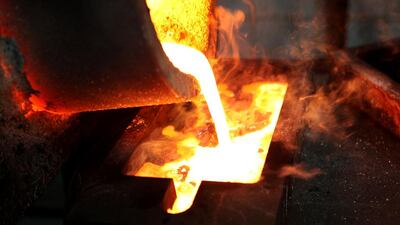The Kaloti jewellery group faced controversy over its gold sourcing again yesterday when the Dubai Multi Commodities Centre said it had removed its Sharjah-based gold refining subsidiary from its list of firms that meet sourcing standards.
The DMCC said that the Kaloti refinery company was removed from its “Dubai Good Delivery” list, which is a seal of approval granted to companies that comply with standards set out by the Organisation for Economic Cooperation and Development. The standards are designed to ensure that gold is not sourced from conflict zones and is not used in money laundering, among other goals.
In a statement, the DMCC said: “DMCC has made it a mandatory requirement for all DGD member refineries for gold to comply with and implement all of the provisions of the DMCC guidance.”
The statement added: “Al Kaloti Jewellers Factory has been delisted from Dubai Good Delivery Gold Members list … because they have not met DMCC’s practical guidance for market participants in the gold and precious metals industry.”
The DMCC did not provide a specific reason for the delisting.
To meet DGD standards, companies must comply with a five-step framework detailing due diligence they must follow in sourcing gold.
The Kaloti group confirmed that the company had been delisted but declined to say why.
Its statement said: “Kaloti Precious Metals can confirm that its refinery in Sharjah will no longer carry Dubai Good Delivery status.”
It went on to say a new refinery in Dubai due to start operations later this year will apply for DGD status and that the delisting will have “no material impact on our ability to operate or trade”.
That new US$60 million Dubai refinery will be one of the world’s largest, with capacity to refine up to 1,400 tonnes of gold and up to 600 tonnes of silver.
Last year, the Kaloti group denied allegations made by an Ernst & Young auditor-turned-whistleblower who had raised compliance questions about sourcing of gold from Morocco and the use of cash for gold payments.
A report by the UK-based ethical trade watchdog Global Witness had claimed that E&Y’s report into Kaloti’s supply chain compliance had serious failures.
Global Witness said the audit findings raised questions about the risk of money laundering and sourcing of gold from the Democratic Republic of Congo and other conflict zones entering the refiner’s supply chain during 2012.
Kaloti yesterday pointed to its statement from last year denying all allegations that it failed to comply with the audit process or regulations, and denied any suggestion that it sourced gold from conflict zones.
“We accept that we had some shortcomings in our initial report, these were quickly rectified to the full satisfaction of our external auditors and the regulators,” the company said at the time.
A report by Grant Thornton, another auditor for Kaloti, last September said it could “ confirm Kaloti’s full compliance with DMCC guidelines, which are based on the OECD’s”.
The statement accompanying that report added that “Kaloti also continues to refute previous false and misleading media allegations made against the company”.
However, DMCC’s action in delisting Kaloti’s refinery leaves open the question as to which of its guidelines the gold refiner has failed to meet.
In 2013, the latest year for which the data is available, the value of all the physical gold traded through Dubai stood at $75 billion accounting for 40 per cent of the international total.
amcauley@thenational.ae
Follow The National's Business section on Twitter

